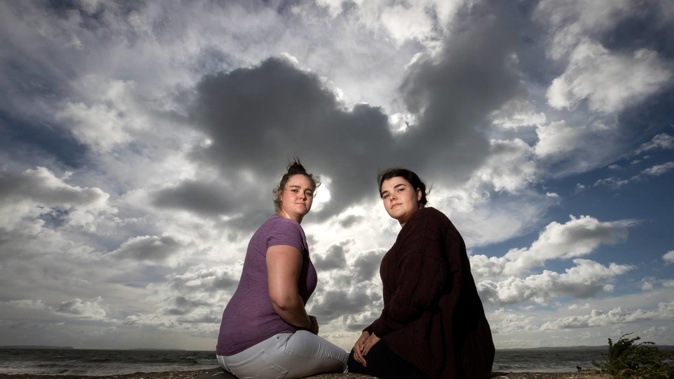
Their friends are starting their adult lives - enrolling in tertiary study, getting jobs, volunteering in their communities.
But Chevaunne and Kayleigh Roffe say they can't do any of that.
The Mairangi Bay sisters' lives are in limbo because of a 19-month backlog in processing their residence visa applications.
"It's quite depressing", Chevaunne Roffe, 18, told the Herald on Sunday.
"We've been here six years. I've been through high school here, I should be allowed to go to uni. I should be joining my friends starting their lives, but I can't."
Chevaunne and Kayleigh, 21, also face an even more daunting prospect - leaving New Zealand without their parents Leilah and Glenn Roffe if their visitor visas expire before residency is granted.
Kayleigh's runs out in August, while attempts are underway to extend Chevaunne's.
And the family say they're far from alone - a post about their plight on the Migrants NZ Facebook page attracted dozens of similar responses.
As of March 9 Immigration New Zealand has 1595 onshore skilled migrant and residence from work applications awaiting allocation to an immigration officer, border and visa operations' general manager Nicola Hogg said, blaming increased demand and Covid-19 disruptions for delays.
"Non-priority onshore applications are currently being allocated from August 2019, while priority applications are being allocated within two weeks."
Chevaunne and Kayleigh are on visitor visas after the student visas attached to their father's original skilled migrant visa expired when they finished high school.
/cloudfront-ap-southeast-2.images.arcpublishing.com/nzme/KMQSOSBZ65LIJC7AIFSBUOGKWY.jpg?width=1112&height=741&mode=max) The Roffe family arrived in New Zealand from South Africa in 2014. Photo / Brett Phibbs
The Roffe family arrived in New Zealand from South Africa in 2014. Photo / Brett Phibbs
The family moved to New Zealand after Glenn Roffe was given a skilled migrant work visa in 2014.
But 2016 criteria changes by the Government meant he wasn't able to later apply for residency, then permanent residency and eventually citizenship, Roffe said.
"I would've had the black book [New Zealand passport] by the end of this year if [the criteria] hadn't changed."
He was able to remain as a spouse when Leilah Roffe received a path to residency visa.
In November last year the entire family became eligible to apply for residence visas via Leilah's path to residency visa.
Hogg said she couldn't talk about the Roffe family's situation, as they hadn't provided a privacy waiver.
But currently 90 per cent of skilled migrant category visas were completed within 23 months, while residence applications took longer to process - they could be complex as they allowed people to stay in New Zealand permanently, Hogg said.
Demand for visas in the skilled migrant category and residence from work sub-category had risen significantly in the last few years, delaying decisions.
Last month, Immigration NZ formalised the priority allocation of some skilled migrant category and residence from work applications for highly paid applicants where their occupation was required to be registered under immigration allocations, she said.
This allowed the government department to start allocating older, non-priority applications on a more consistent basis.
Immigration NZ offices had also closed during last year's alert level 4 lockdown and, because skilled residence applications are paper-based, staff couldn't process them.
At level 2, fewer staff could be on-site, while August and February alert level changes also impacted processing times, Hogg said.
But Glenn Roffe said blaming Covid-19 was a smokescreen.
"The August 2019 applications are only now being allocated to case workers … that's seven months before Covid even hit."
His children, and others in the same position, were suffering.
As well as being unable to work, his daughters are ineligible for state subsidised medical care and education - unless they pay international student fees of more than $30,000.
"My eldest has a new bed, and it's had three years of sitting on it."
She kept her spirits up by going to the gym and meeting friends - "when they're not working or studying", Kayleigh Roffe said.
She's also studying towards becoming a chartered accountant through an overseas tertiary provider, but would rather study in person.
And until this year she volunteered at her old school, Rangitoto College, and for Auckland Unlimited and America's Cup Events, but stopped after the family's immigration agent said volunteering could put her residence application at risk because any indication of receiving financial gain could be seen as a breach of the visitor visa.
Financial gain could include learning skills that might help get a job later, the family were told.
However, Hogg said those on visitor visas can volunteer without impacting their residence application, as long as they're not doing it for gain or reward - which is any payment or benefit which can be valued in terms of money, such as board, food or transport.
Volunteering gave her "a reason to get out of bed", and she missed it, Kayleigh Roffe said.
"I have my days where I honestly cry because there's nothing I can do [about our situation]."
It was a daunting prospect potentially having to leave New Zealand when her visitor visa expires.
She'd probably go to the United Kingdom, where she has no family but has a British passport through her mother. She has family in South Africa, where she was born, but "the UK is safer".
"[But] I'd be all alone somewhere I've never lived."
For Chevaunne, still being dependent on her parents made her feel like a child again.
"Your friends all say 'let's go out for dinner' and I have to say 'I've got to ask my mum'. I feel like I'm back in year 5 … I feel like 'wow, everybody's moving on with their lives and I'm just stuck.'"
Take your Radio, Podcasts and Music with you









